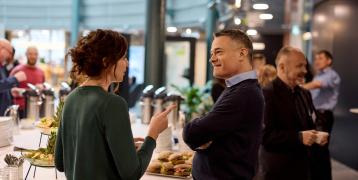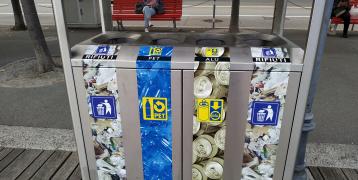Rescue food! From food waste to food aid

When thinking about food waste, many will imagine food scraps or expired food in the fridge. The food waste issue is, however, much larger than that, and is acknowledged as an environmental, economic and social problem that needs to be resolved urgently.
Production, consumption and disposal of edible food contribute to the release of CO2 emissions, and a significant economic loss. Moreover, even if just one fourth of the food wasted worldwide could be rescued, it would be sufficient to feed all people suffering from food insecurity in the world.
In the EU, over 58 million tonnes of food waste (131 kg/inhabitant) are generated every year, with an associated market value estimated at 132 billion euros. Eurostat roughly estimates that around 10% of food made available to EU consumers (at retail, food services and households) may be wasted. At the same time, over 37 million people in the EU cannot afford a quality meal every other day.
Everyone has a role to play in preventing and reducing food waste, from those who produce and process food (farmers, food manufacturers), to those who sell it (retailers, hospitality industry) and consume it (restaurants, schools, canteens, citizens).
Local and regional governments can create a policy environment that stimulates food waste prevention and reduction initiatives, including green public procurement measures and economic incentives (e.g. fiscal incentives for food donation). Food waste is a multifaceted issue affecting different policy areas.
Relevant public services should therefore coordinate efforts and develop integrated action plans to tackle food waste effectively. Local and regional policy-makers can also support collaboration between all actors of the food supply chain for a more sustainable food system.
The prevention and reduction of food waste has been an important topic in several Interreg Europe projects, generating a large body of know-how and good practices on the subject. This article will highlight three examples coming from the CORE and CITISYSTEM projects, all concerning food waste prevention.
Raising awareness to prevent food waste
The Hungarian National Food Chain Safety Office has launched a so-called Wasteless programme in 2016, in response to high levels of food waste recorded in the country (CORE). The programme aimed at raising awareness and educating about the food waste issue. When ‘Wasteless’ was launched in 2016, it found that 68 kg of food waste per capita were generated in households, one third of which could have been prevented. This figure has decreased to 59 kg as of 2022.
Various activities are undertaken in the programme, including:
- conducting household surveys to measure the amount of generated food waste
- awareness raising activities for children
- educating households by providing them with useful tools and tips (a dedicated website with information was created, as well as a calculator where every household can measure their progress)
- organising educational workshops for actors in the food supply chain.
Resale of surplus food
Another example from Hungary, also identified by the CORE project, is the Munch app. Restaurants, bakeries, and pastry shops can sign up, offering leftover but good quality food at a discount, instead of throwing it away. Customers can then find the Munch (food for sale) nearest to them based on their geographical location and buy it with a discount of 30 to 40%. A portion of the Munch is also donated to people in need.
The app is active all over Hungary, and plans to expand to Slovakia, Slovenia and other countries. So far, the app was able to redistribute over 1,000,000 portions of saved food, preventing the emission of over 1600 tonnes of greenhouse gases. Over 11 500 food portions have been delivered to people in need resulting in savings of EUR580,000, and the enrolment of thousands of registered members.
Organising local food aid
In the Finnish City of Lahti, food waste reduction is one of the actions identified in the City’s Circular Economy roadmap, as a means to reach the goal of becoming a carbon neutral and waste-free city, respectively by 2025 and 2050. In 2021, the city found out that more than 57,000 tonnes of food waste were generated in grocery stores, with bread being the number one wasted item. Lahti supported local NGOs to develop an organised a way of delivering food aid to people in need (CITISYSTEM).
The NGO ‘Operation Open Door (OOD)’ is one of the local food aid actors. The organisation has contracts with grocery stores, which supply the NGO with surplus food in the order of 85 tonnes per month. The NGO collects and stores donations from different companies in cold storage and passes them to food distributors. These distributors can then deliver about 17,000 food aid packages per month.
One of the biggest challenges for the Operation Open Door is the lack of paid workers. Päivi Sieppi, from the City of Lahti explains: “The organisation only relies on volunteers, who are quite old people. I think that we really should have some paid workers in this field. Some cities in Finland have recruited workers to organize this kind of work. Not the City of Lahti, but we are already working on it.”
Päivi Sieppi believes there has been a visible improvement in Finland, when it comes to the food waste issue. “The supermarkets are offering products close to their expiration date for a significant discount and people are using that opportunity, we can see that the amount of food left over for NGOs has decreased over the last years”. Restaurants are selling surplus food at a discount as well, and in some you even have to pay extra if you don’t finish your meal.
There are many ways how local and regional authorities can support food waste prevention. These include awareness raising campaigns and education of citizens and food companies, collaboration with NGOs on surplus food redistribution, or supporting start-ups such as the Munch app. According to Sieppi, municipalities need to focus on “coordination, cooperation, as well as providing financial and other resources such as storage facilities”. In any case, public bodies have an important role to play in food waste reduction.
Learn more
For more information and inspiration on how to rescue food, please also see:


Reducing food waste and food poverty: the mission of a social enterprise
Take a look at the good practice from ECOWASTE4FOOD and how they are repurposing food.

Citizens involvement for sustainable food systems
Discover European initiatives and Interreg Europe projects that work towards a sustainable food system and get inspired!

Green public procurement: Key learnings
On 27 April, the Policy Learning Platform hosted the first webinar of the waste prevention series. This session focused on green public procurement, watch the recording and discover the key learnings.

Zero waste education and participation: Key learnings
On 4 May, the Policy Learning Platform hosted the second webinar of the waste prevention series. This session focused on zero waste education and participation, watch the recording and discover the key learnings.- Webinar: ‘Waste Prevention I: Green Public Procurement’ and watch the presentation of Brian Quirke, Government of Ireland (Ireland) on ‘Ireland’s Green Public Procurement Approach’ (GPP4GROWTH)
- Webinar: ‘Waste Prevention II: Zero Waste education and participation’ and watch the presentations of Antoine Delaunay Belleville on Disco Soup encourages citizen participation and food waste prevention, France (CECI) and of Patricia van Hemert, on Zero Waste Lab Plein 40-45, Netherlands (ABCitieES)